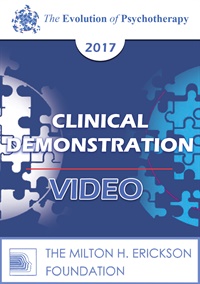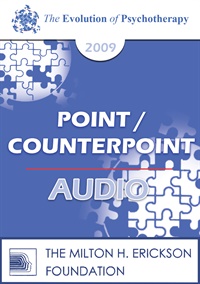
- Average Rating:
- Not yet rated
- Topic Areas:
- Point/Counterpoint Sessions | Art and Creativity | Psychotherapy | Therapist Development
- Categories:
- Evolution of Psychotherapy | Evolution of Psychotherapy 2009
- Faculty:
- Jeffrey Zeig, PhD
- Duration:
- 1 Hour 11 Minutes
- Format:
- Audio Only
- Original Program Date:
- Dec 12, 2009
- Short Description:
- Science measures, art impacts. We will study methods of impact used in various arts, including painting, music, writing, movies and dance. These methods can be applied in therapy where they can provide impact, making clinical work more experiential, more effective. A model will be offered and explained.
- Price:
- $15.00 - Base Price
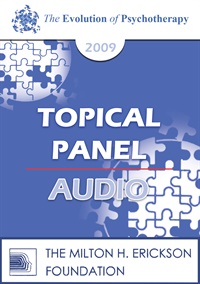
- Average Rating:
- Not yet rated
- Topic Areas:
- Psychotherapy | Topical Panels | Art and Creativity
- Categories:
- Evolution of Psychotherapy | Evolution of Psychotherapy 2009
- Faculty:
- Steven Hayes, PhD | James Hillman, PhD | Erving Polster, PhD
- Duration:
- 56 Minutes
- Format:
- Audio Only
- Original Program Date:
- Dec 12, 2009
- Short Description:
- EP09 Topical Panel 17 – Psychotherapy: Art or Science? – Steven Hayes, James Hillman, and Erving Polster Educational Objective: To compare and contrast clinical and philosophical perspectives of experts.
- Price:
- $15.00 - Base Price
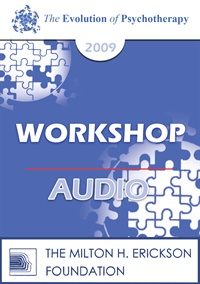
- Average Rating:
- Not yet rated
- Topic Areas:
- Psychotherapy | Workshops | Art and Creativity | Experiential Therapy | Therapist Development
- Categories:
- Evolution of Psychotherapy | Evolution of Psychotherapy 2009
- Faculty:
- Jeffrey Zeig, PhD
- Duration:
- 1 Hour 51 Minutes
- Format:
- Audio Only
- Original Program Date:
- Dec 10, 2009
- Short Description:
- Experiential methods enliven therapy through dynamic experiences that promote dynamic realizations. We will explore methods that make therapy a visual art, recognizing the visual realizations are neurologically encoded more robustly than words, hence more easily accessed when needed. We will explore the use of gestures, objects, and even sounds to empower change. We will learn the latest advances in therapist sculpting. Lecture, demonstration, and small group exercises will be used
- Price:
- $15.00 - Base Price
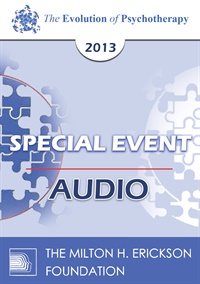
- Average Rating:
- Not yet rated
- Topic Areas:
- Special Topics | Art and Creativity | Storytelling
- Categories:
- Evolution of Psychotherapy | Evolution of Psychotherapy 2013
- Faculty:
- James Foley
- Duration:
- 1:55:16
- Format:
- Audio Only
- Original Program Date:
- Dec 10, 2013
- Short Description:
- James Foley will present Storytelling from a Film Director’s Perspective. Mr. Foley will be interviewed by Dr. Zeig. Therapists of all persuasions can learn about impact from studying the methods that filmmakers use. After all, directors are experts at eliciting alterations in mood and perspective. We will view and discuss clips from some of Mr. Foley’s films to learn some of the methods that make movies work, methods that can empower psychotherapy.
- Price:
- $15.00 - Base Price

- Average Rating:
- Not yet rated
- Topic Areas:
- Psychotherapy | Dialogues | Art and Creativity
- Categories:
- Evolution of Psychotherapy | Evolution of Psychotherapy 2013
- Faculty:
- Robert Dilts, BA | Ernest Rossi, PhD
- Duration:
- 1 Hour 1 Minutes
- Format:
- Audio Only
- Original Program Date:
- Dec 13, 2013
- Short Description:
- EP13 Dialogue 06 – Creativity – Robert Dilts and Ernest Rossi, PhD Moderator: Richard Landis, PhD Educational Objectives: Given a topic, describe the differing approaches to psychotherapy, and identify the strengths and weaknesses of each approach.
- Price:
- $15.00 - Base Price
- Average Rating:
- Not yet rated
- Topic Areas:
- Point/Counterpoint Sessions | Communication | Evocative Communication | Psychotherapy | Therapist Development | Art and Creativity
- Categories:
- Evolution of Psychotherapy | Evolution of Psychotherapy 2013
- Faculty:
- Jeffrey Zeig, PhD | Donald Meichenbaum, PhD | Kathryn Rossi, PhD
- Course Levels:
- Master Degree or Higher in Health-Related Field
- Duration:
- 1:29:19
- Format:
- Audio and Video
- Original Program Date:
- Dec 14, 2013
- Short Description:
- Building on the contributions of Milton Erickson, MD, therapists can advance their work through the introduction of evocative techniques gleaned from studying codes of influence in the arts. The artist and the therapist share similar domains: a striving to alter perception; to modify and expand perspectives; and to stir the human heart. Therapists can explore how to use untapped aspects of their medium through teasing out the connections between the palette of the artist and the traditional toolbox of the clinician.
- Price:
-
Sale is $29.00
price reduced from Base Price - $59.00
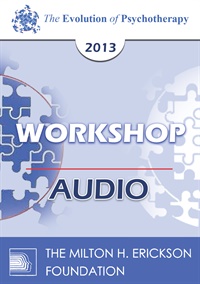
- Average Rating:
- Not yet rated
- Topic Areas:
- Workshops | Unconscious Processes | Art and Creativity | Consciousness | Four-Stage Creative Process | Psychotherapy
- Categories:
- Evolution of Psychotherapy | Evolution of Psychotherapy 2013
- Faculty:
- Ernest Rossi, PhD | Kathryn Rossi, PhD | Bruce Gregory, PhD | Birgitta Gregory, PhD
- Duration:
- 2 Hours 32 Minutes
- Format:
- Audio Only
- Original Program Date:
- Dec 11, 2013
- Short Description:
- What is Life? What is Consciousness? Theory, research and practice of Psychosocial Genomics are outlined as the next step in the Evolution of Psychotherapy. A live group demonstration of how to facilitate gene expression and brain plasticity by optimizing the 4-stage creative process for 20 minutes will be experienced by everyone.
- Price:
- $15.00 - Base Price
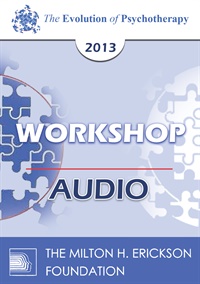
- Average Rating:
- Not yet rated
- Topic Areas:
- Workshops | Children and Adolescent Therapy | Gestalt | Art and Creativity | Psychotherapy
- Categories:
- Evolution of Psychotherapy | Evolution of Psychotherapy 2013
- Faculty:
- Violet Oaklander, PhD
- Duration:
- 2 Hours 16 Minutes
- Format:
- Audio Only
- Original Program Date:
- Dec 14, 2013
- Short Description:
- An approach to working with children and adolescents that involves a variety of projective, creative and expressive techniques with Gestalt Therapy theory, philosophy and practice as the underlying framework. Included will be an overview of the Oaklander model of the therapeutic process, case material, a direct experience, and discussion.
- Price:
- $15.00 - Base Price
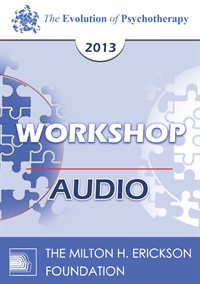
- Average Rating:
- Not yet rated
- Topic Areas:
- Workshops | Art and Creativity | Psychotherapy | Utilization | Communication
- Categories:
- Evolution of Psychotherapy | Evolution of Psychotherapy 2013
- Faculty:
- Jeffrey Zeig, PhD
- Duration:
- 1 Hour 43 Minutes
- Format:
- Audio Only
- Original Program Date:
- Dec 15, 2013
- Short Description:
- Language is both informative and expressive. It is the expressive component that elicits changes in emotion, sensation, “state,” and physiology; the words only convey part of the message. We will study the effective use of prosody, proximity, gesture, expression and context, and how those channels can be woven into the process of communication to create dramatic moments that empower effective clinical outcomes. Lecture, demonstration, small group practice.
- Price:
- $15.00 - Base Price
Credit available - Click Here for more information
- Average Rating:
- Not yet rated
- Topic Areas:
- Clinical Demonstrations with Discussant | Emotionally Focused Therapy (EFT) | Generative Psychotherapy | Art and Creativity | Goals of the Therapist | Psychotherapy
- Bundle(s):
- Learning Track - EP17 Erickson Stream | EP17 Video Stream Build a Bundle
- Categories:
- Evolution of Psychotherapy | Evolution of Psychotherapy 2017 | Evolution of Psychotherapy Erickson Learning Track | Online Continuing Education
- Faculty:
- Stephen Gilligan, PhD | Sue Johnson, EdD
- Course Levels:
- Master Degree or Higher in Health-Related Field
- Duration:
- 1:27:23
- Format:
- Audio and Video
- Original Program Date:
- Dec 14, 2017
- Short Description:
- This demonstration will show how activating a client’s creative process is the key factor in generative psychotherapy. This process follows four steps: 1) Identifying a goal (A positive change or transforming a negative pattern), 2) Developing a generative state, 3) Utilizing the generative state to creatively achieve the goal, and 4) Guiding the session changes into real life achievement.
- Price:
- $0.00 - $29.00
Please wait ...



